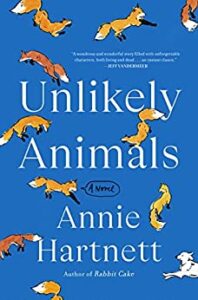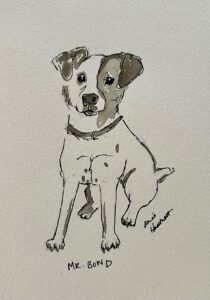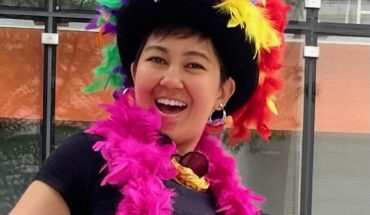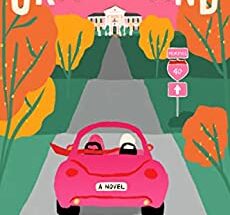 Annie Hartnett’s second novel, UNLIKELY ANIMALS, is the story of Emma, a med school dropout returning to her small New Hampshire hometown to take care of her father who is suffering from dementia. This funny and intricate novel weaves together the stories of the residents of Everton, New Hampshire, and includes ghosts, the healing touch, a secret compound, and many unlikely animals like wild boar and a Russian fox (but no mountain lions). Fans of Hartnett’s first novel, RABBIT CAKE, will recognize her particular blend of humor and tragedy that skillfully conveys the bittersweet and complex nature of relationships, especially among family.
Annie Hartnett’s second novel, UNLIKELY ANIMALS, is the story of Emma, a med school dropout returning to her small New Hampshire hometown to take care of her father who is suffering from dementia. This funny and intricate novel weaves together the stories of the residents of Everton, New Hampshire, and includes ghosts, the healing touch, a secret compound, and many unlikely animals like wild boar and a Russian fox (but no mountain lions). Fans of Hartnett’s first novel, RABBIT CAKE, will recognize her particular blend of humor and tragedy that skillfully conveys the bittersweet and complex nature of relationships, especially among family.
What inspired you to write UNLIKELY ANIMALS? How did you plan all the different story lines?
This is a really long story, but I’ll keep it short– but for now, this novel came about when I was traveling in New Hampshire, and I came across this enormous yellow mansion in the middle of a rural area. I googled it, and found out that it was built by a 19th century robber baron and that he’d also built a 26,000-acre exotic animal park… and that the park is still there today. I became obsessed with the place, especially after I learned that the park’s naturalist was a real-life Dr. Doolittle who lived with animals in his house. I was already writing a novel about a family set in modern day, but I couldn’t resist using this gold mine of cool stuff… so I set the novel near the hunting park, and made the naturalist character a ghost. I’m a big believer in following your obsessions when you write. And so the novel contains all my obsessions, and then I wanted them to all tie into a big finish in the end.
UNLIKELY ANIMALS takes on a number of really difficult topics—dementia, the opioid crisis, abduction, death—but uses a very light tone overall, was it hard to strike that balance? How did you keep the tone of the book from getting too dark or slipping into farce?
In general, the way that I cope with the world is to try to find the humor in things that are uncomfortable and painful. That’s how I was raised. We tell each other jokes in order to get through the hard thing, or insert something silly into an otherwise painful situation. But I’m not the clown in my family, I’m the quietly funny one. My younger brother gets the big laughs. I remember once my parents were having an intense argument, all five of us were crammed in the car, and my brother pulls up his shorts and says: “Will everyone just take a minute to look at my milky white thighs?”
So I like writing books, because I finally get to be the funny one.
There are also a lot of magical or supernatural elements in the novel. How did you want your readers to understand the magic in your story and what do you think they add to the novel?
Ghosts and magic free you up to do whatever you want. I like to take things that are real to some people and then pile them on top of each other, and I like to play with coincidence. It makes the story feel really magical, but if you look at each thing you can ask, “Is that really magical?”
One of my big goals as a writer, in general, is to get people to relax and enjoy the story. The magic makes the story more fun.
The novel is told from a very unusual point of view. Why did you decide to tell the story from such a different perspective? Did you have any inspirations for that choice?
The novel was not originally told from the perspective of the ghosts in the cemetery. It was originally this booming omniscient narrative voice because I wanted it to feel like a 90s movie or a John Irving novel where there is a big voiceover. I knew I couldn’t do another first-person narrator since Elvis (the narrator of RABBIT CAKE) had such a strong voice, but I was really interested in first-person plural. I loved the way Brit Bennett did THE MOTHERS, how she used the “we” but then it would disappear and would feel like third-person.
I was revising the first draft during a month-long residency at MacDowell which is where Thornton Wilder wrote OUR TOWN. I started to consider the idea of telling the story from the ghosts’ perspective, but George Saunders had recently published LINCOLN AND THE BARDO then. Still, I tried it. I showed it to a friend, and he said I was working in a long tradition (Spoon River, etc.) and that I was making it my own. After that, I didn’t question it anymore. The book had come from all those different things I wanted to write about, but getting the voice helped me figure out what the book was actually about.
UNLIKELY ANIMALS is your second novel, how was the writing process for this novel different from the first? Was it easy sailing or did you have any false starts or dead ends along the way?
RABBIT CAKE began as my MFA thesis, so I had a lot of feedback and support along the way. Writing a first book is distinctive. You don’t have anyone in your head telling you what you do or don’t do well. Your writing hasn’t been reviewed in quite the same way. The second book was confusing because I wasn’t sure how to write another book. It’s a fraught process. You can’t help but ask “Can I do it again?” So my friend Tessa Fontaine (author of the wonderful THE ELECTRIC WOMAN) and I teamed up to keep each other accountable to write our second books—that accountability changed everything for me. We used this contract from this Aimee Bender essay, which I use with all my novel writing students.
Was there anything in the novel that you had to cut or leave behind along the way? Did you have to kill any darlings?
There was a whole subplot about a mountain lion that was stealing jewelry and putting it in his cave that my editor asked me to cut out. She was right, it didn’t really add anything to the main plot; I just liked it as a side story. I do love side stories. But in general, I’m not precious about anything that gets cut. I always feel like the last version is the best one.
Your first novel, RABBIT CAKE, was published by an independent publisher and UNLIKELY ANIMALS is being put out by one of the big four. Did that make a difference in your experience as a writer? If so, how was the process different along the way?
If the pandemic hadn’t been going on during the publishing process for UNLIKELY ANIMALS, it might have felt different to go to New York and do those exciting big publishing things, but I didn’t—so I don’t know if there’s been any difference, at least so far. The truth is I really liked both of my editors. They’re both very smart, very helpful, have good senses of humor and get my books. In that sense, the experience of working with a great editor to get to the final version was very similar.
In addition to writing this funny and complex novel, you also had a baby along the way. How did motherhood impact your writing and publication process?
It was intense because I was not done with the book when she was born. I started editing it again when she was 10 days old. It was very hard, but I also loved it. When I’m in a good place with a creative project, I function on a different level. I need less sleep. The most intense part was after it was “done”, when it sold, and I was editing again, and there was still a huge amount of work to do. And the pandemic hit. I didn’t have childcare for that year, my husband and I stayed totally isolated, so I would get up at 3:30 in the morning to get work done before the day started. We finally got childcare after we got vaccinated, but at that point I only had copy edits left. I’m only having one child, so I think this book will probably be the most difficult one I’ll ever write. At least I hope it will!
What advice do you have for aspiring novelists now that your second book is coming out? What do you wish someone had told you way back when?
For me, I needed to learn that I shouldn’t write out of order. Sit down and write one scene after the next until you’re done. Every time I edit I always start at page one. I never skip around. It loses all sense of fun for me that way, writing all over the book—I never feel like I’m getting anywhere. I need to write the way I read, beginning to end. I need that momentum of seeing how the story is moving.
What are you reading now or looking forward to this spring?
I just finished HOW HIGH WE GO IN THE DARK by Sequoia Nagamatsu which I loved. I also read GOOD GRIEF by E.B. Bartels which is a wonderful book about losing pets, coming out this August. It was right up my alley, as someone with a tattoo of my dead dog’s name. I recently read SIRENS AND MUSES by Antonia Angress. It’s a campus novel set at an art school that has really compelling characters and is coming out in July, a great summer read.
Last question, in the period before publication, you were doing drawings for people who pre-ordered your book. How many drawings did you end up doing?
I started doing drawings while I was at MacDowell with the New Yorker cartoonist Amy Kurzweil. When the book was getting put together, they asked me to draw the map for the book. Later on, I decided to do drawings for pre-orders and at this point, I have done 423 requests. The best part is the connection I’ve made to the people I’ve drawn for. It’s amazing to see how much the drawing can mean to someone.
It’s so true. I have one of the drawings of my dearly departed dog, Mr. Bond, and I absolutely treasure it.

Annie Hartnett’s debut novel, RABBIT CAKE, was listed as one of Kirkus Reviews’ Best Books of 2017, was a finalist for the New England Book Award, an Indies Introduce and an Indie Next Pick, and was People magazine’s Book of the Week. It is currently under option with Amazon Studios Annie’s new book UNLIKELY ANIMALS is from Ballantine/Random House. She lives in Providence RI with her husband, daughter, & their border collie, Willie Nelson



